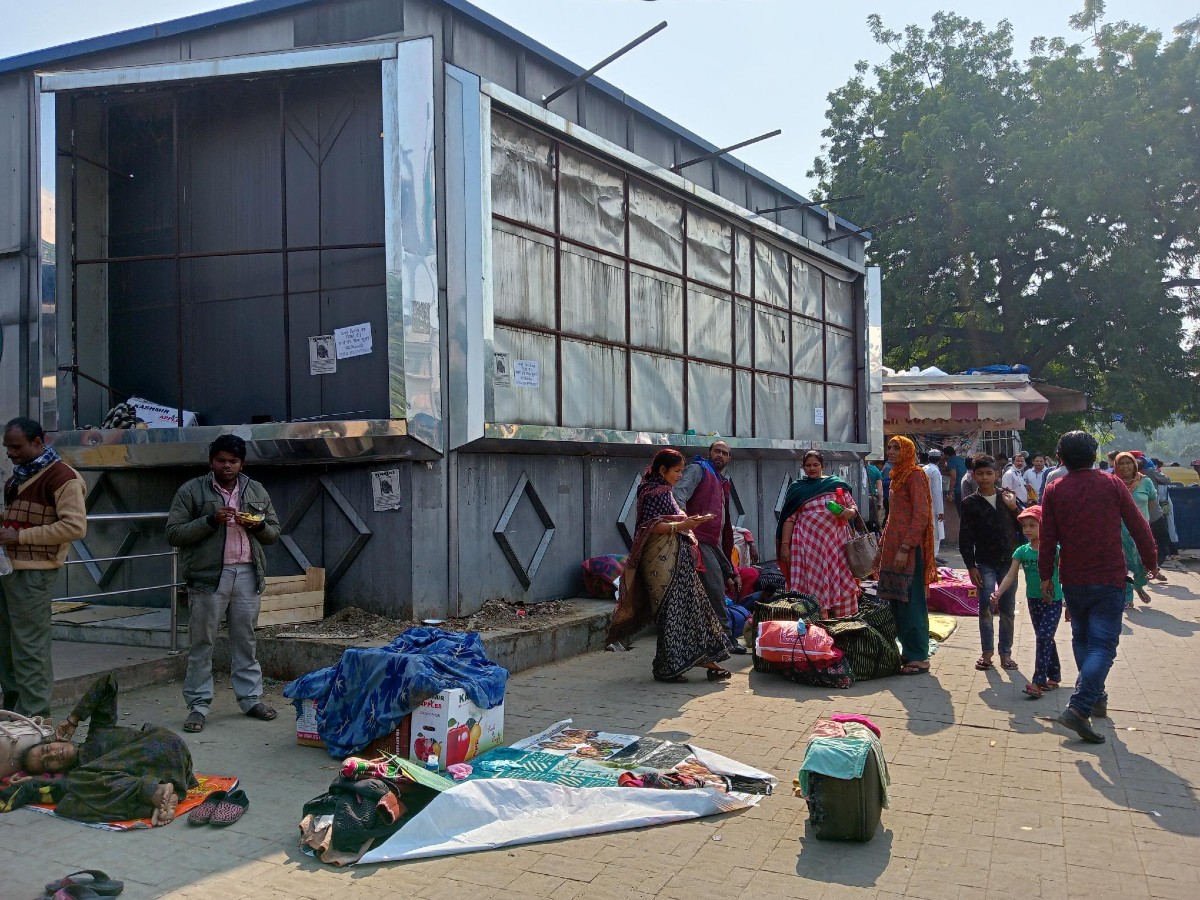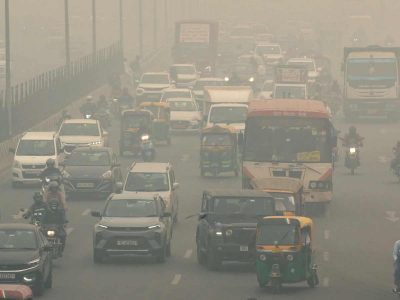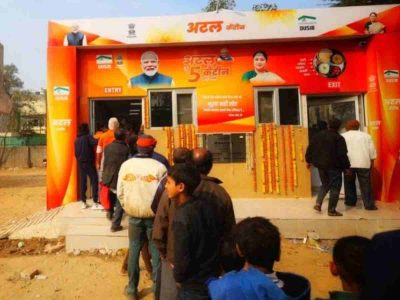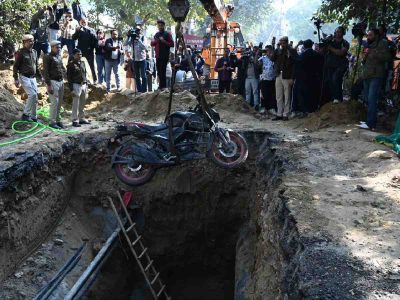Rani Devi wakes up at 6 am every morning to grab the first place in the queue for breakfast, distributed by good samaritans in charity. She hopes to collect food for her family at the earliest, while her husband takes their daughter, the patient, for defecation. However, she always finds “10 or 12” people waiting ahead of her. Such is the rush.
“We have been living here on the footpath for the past 17 days and have been visiting the hospital for the past four years for my daughter’s treatment,” she says.
Their little one is seven-year-old and suffering from Chronic Obstructive Pulmonary Disease, an inflammatory condition that causes obstructed airflow from the lungs. The family hails from Chichroli village in Rajasthan’s Jhunjhunu district.
Also read: Children – Delhi pollution’s prime target
Rani Devi’s family is one among the sea of people waiting on the road either for their own treatment or that of their kin. Many spend the day on the pavement and move to the subway to sleep at night. But not everyone is lucky to get space there. It is survival of the fittest.
Outside the All India Institute of Medical Sciences (AIIMS), the road is packed with outstation patients, who throng the premier medical institute of India, hoping for a cure to their or their dear ones’ ailments. It is a scene of helplessness as patients end up on the road, their clothes arrayed on the divider for drying.
In pain, and roofless
Outstation patients arrive at AIIMS from far-flung areas due to the hospital’s reputation and economic viability, but they complain of “lack of empathy from the administration and government”.
“We are here because our district does not have enough medical facilities for my daughter’s treatment. We were referred to AIIMS and this is our only hope. It’s a known fact that AIIMS attracts a lot of patients, but the situation of accommodation remains the same every year with no change. Already we are neck-deep in worry for our daughter and then this added problem,” says Devi, who has always ended up on the road whenever she had to come to the hospital in the last four years.
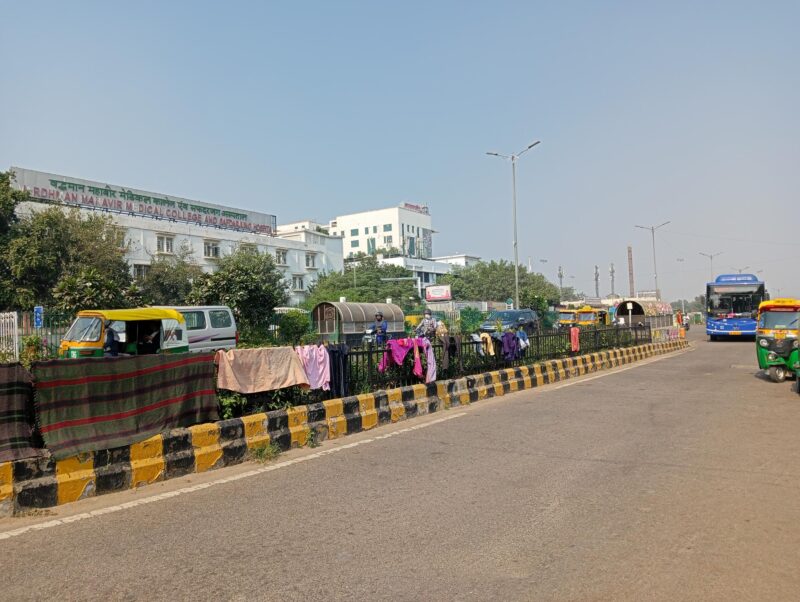
the hospital
Five-year-old Aradhya, hailing from Uttarakhand’s Khatima, was diagnosed with blood cancer five months ago. She has come to AIIMS for her treatment with her mother, Binati.
“We usually come and leave immediately, but this time our date of appointment got delayed so we are waiting for one,” says Binati.
“Food is not a problem here because people from different NGOs come here to distribute food day in and day out, but accommodation is a great issue. My daughter is small and I get sleepless for her safety on the road. I get thoughts of her disappearance while I am asleep,” she says.
Many patients questioned the government’s apathy towards outstation patients.
“Why are there not enough facilities created for us,” asks Shadman. The 43-year-old is from Uttar Pradesh’s Mainpuri and has been living under the sky with his wife and son for the past eight days to treat his orthopaedic issues. His wife has multiple disabilities, including deaf-blindness.
He continues, “The shelter near the hospital is always full. But it seems there has been no review of the situation by the government. There should be more facilities for outstation patients, otherwise where will we go? The government is aware that patients sleep on the pavement outside AIIMS, but who does anything about it? Even the accommodation inside the hospital is full.”
In jeopardy
Besides the helplessness and discomfort of living on the road, patients feel very unsafe living on the pavement.
“We are so vulnerable! Our belongings often get stolen. Sometimes we see others’ being robbed in the middle of the night. We do not get proper sleep. Not all of us get to sleep inside the subway because it fills quickly,” says Taufiq, a cardiac patient from Moradabad, UP.
Sharing more anecdotes, he elaborates, “Just yesterday we had a squabble with a few alcoholics who were aimlessly loitering on the pavement and then began misbehaving with the women here. We ignored them initially, but then we had to intervene.
“Cops are stationed here 24 hours but they never step out unless there is a physical fight. When we approach them, they say that they cannot act unless we lodge a complaint. Now, tell me, we are sick and here for few days, why would we want to get into all this?,” he complains.
Police officials present at the spot refused to speak on the matter, when they were approached.
“Good samaritans come to donate blankets to us, but they are often snatched away by the homeless folks, who are not patients,” says Ramveer, another cardiac patient.
Besides insecurity, the patients appealed to the government to control the prices of medicines that are not available in the AIIMS-registered medical stores.
“While 70% medicines are available in the AIIMS medical stores, some are not and those cost us a bomb,” he says.
Unfeasible rents
For the past five years, Shankar has been frequenting AIIMS from his hometown Etah (UP) for his son’s treatment. The five-year-old is suffering from atrial septal defect (a hole in the heart). When it is a matter of 4-5 days, he lives in rented rooms around the area (if he finds place), but in case of a month-long affair, he lives on the road out of no choice.
“Not everyone can find space in the Ashram or inside the hospital’s lodge because they fill up fast. The rent in private facilities is high. Until three years ago, it was Rs 100 per room per day, but now the amount has increased to Rs 400-500 per room per day. That is a lot if one has to stay here week after week,” says the 32-year-old.
Usually, his trips last for two weeks at the most, but this time it has been eight weeks already.
“In over a month, I was able to find space for both of us only thrice in the subway. You can imagine the demand for it. Now, I no more fight for it because I do not have the mental strength,” he says.
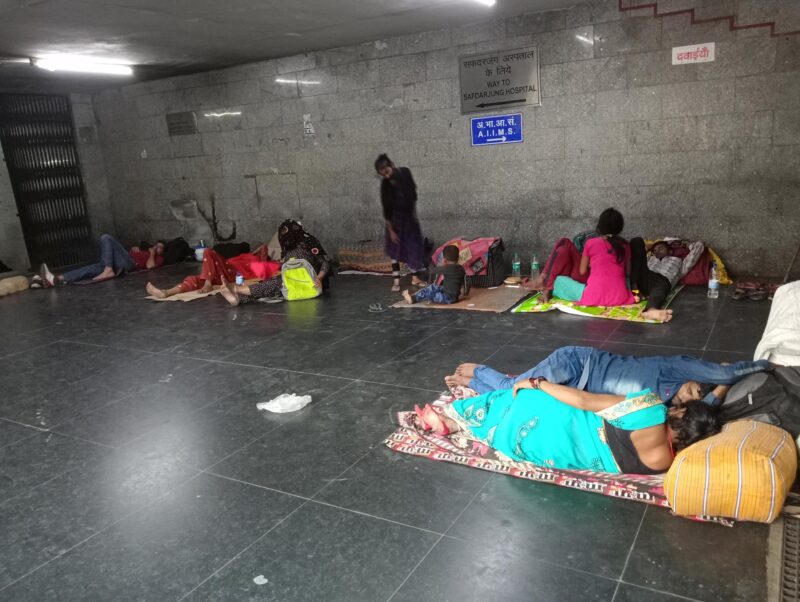
handful are lucky to find space in it at night
Meanwhile, 34-year-old Rajat, who has been living in the subway for three weeks now, feels “safer inside the subway than out on the road”.
He is waiting to take his brother, who suffered a severe motorcycle accident, home to Aligarh.
“Until 12 am, some of us take shelter inside the metro station, but after that, we are shooed away like animals by the security people when it is time to down the shutters. We are even scared to speak to the media about our problems because we are afraid that it may lead the administration to drive us out,” says Shadman.
Good Samaritans
Around 12:30 pm, in a serpentine queue, hundreds of people are waiting to be served lunch, which includes rice, daal and kadhi.
“We come here everyday around this time to serve lunch. Other organisations and volunteers serve breakfast, snacks and dinner. We take care of the afternoon slot,” says Lalit Sharma, working with the Bhaorao Deoras Seva Nyas, a non-governmental organisation.
According to Sharma’s estimate, around 500 people are served free lunch. This includes not only the patients, but every hungry stomach – whether it is a rickshaw puller or a ragpicker.
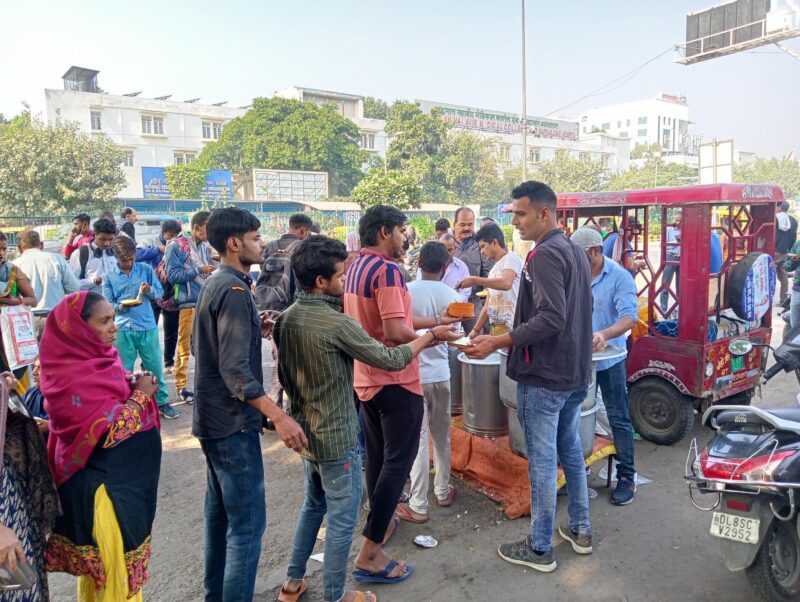
many servings as they want
“I have been working here for five years. AIIMS is just one of the locations, we serve food in different areas during different times of the day. For example, our next stop is RML hospital,” he adds.
“There is no restriction in serving. You can take as much and as many helpings as you want. We are here to ensure that no person, especially who is ailing, goes to bed hungry,” he concludes.
While patients are largely happy with the services of such NGOs, their anger is against the administration, which, they claim, has “largely failed” to embrace the outstation patients.
Follow us on:
Instagram: instagram.com/thepatriot_in/
Twitter: twitter.com/Patriot_Delhi
Facebook: facebook.com/Thepatriotnewsindia

